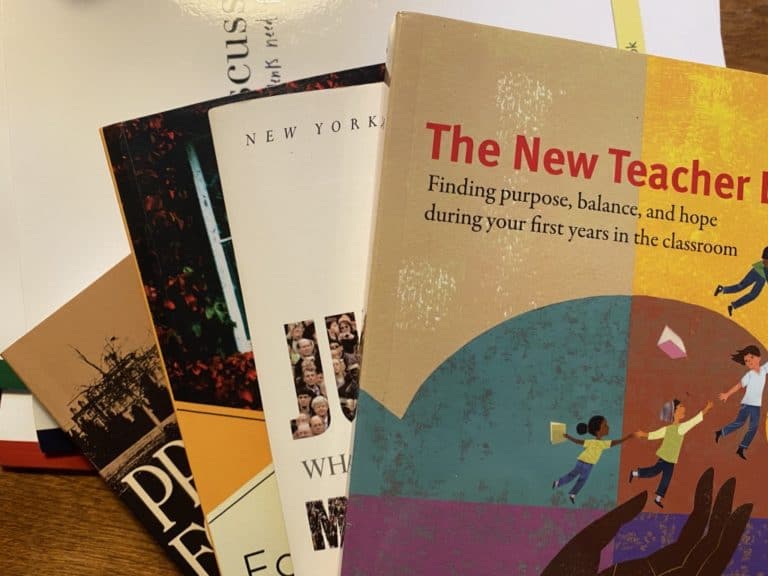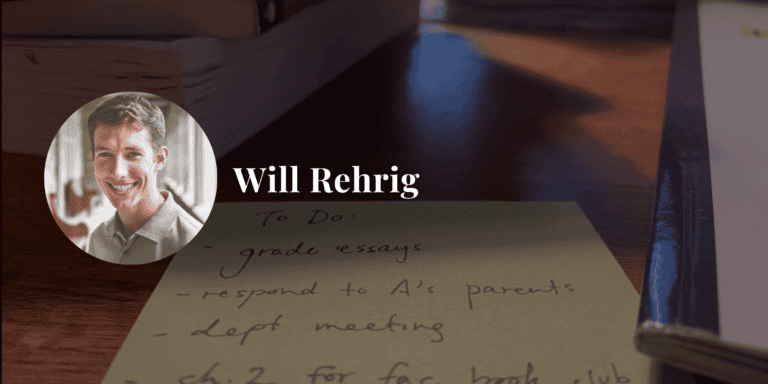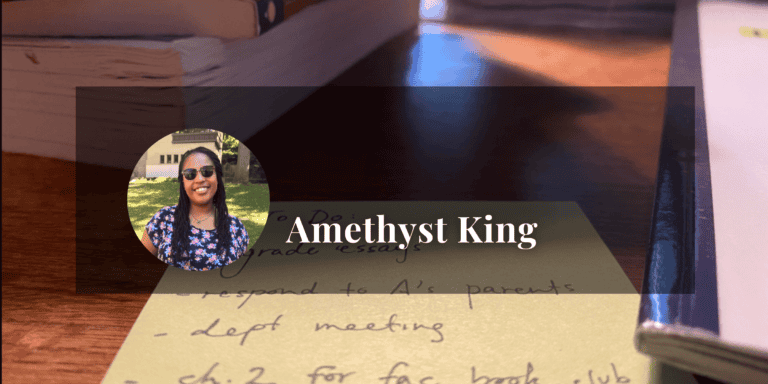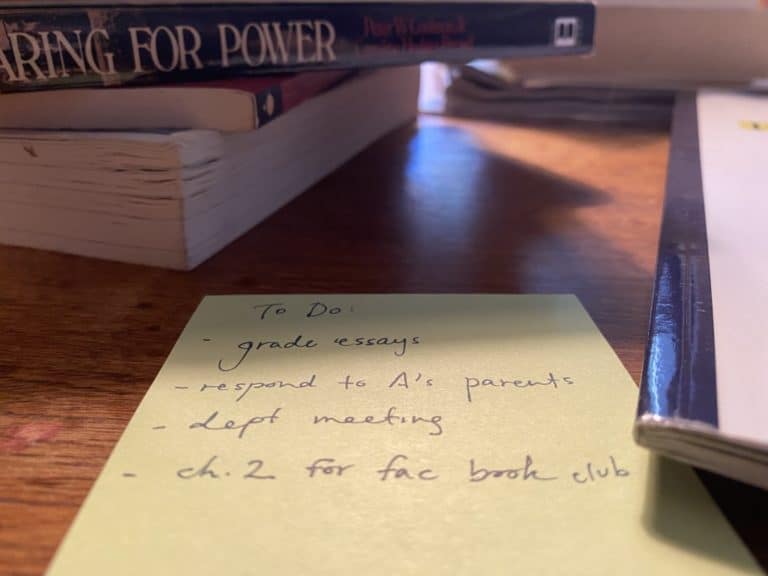R.E.A.L.® Teacher Feature: Matt Tilford & Jack Fischer
Thank you to Matt Tilford and Jack Fischer for sharing their REAL lives with us! Matt and Jack teach history at Woodward Academy in Atlanta, Georgia. Here are their thoughts on discussion, R.E.A.L.®, and learning.
Names/Hometowns:
Matt Tilford: Joshua Tree, California
Jack Fischer: St. Louis, Missouri
Current School:
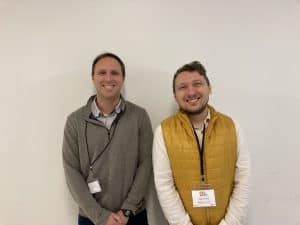
Woodward Academy in Atlanta, Georgia
Can you describe yourself as a student in three words?
Matt: Academic, musical, overachiever.
Jack: Curious, inconsistent, engaged.
Who was your favorite teacher, and why?
Matt: This is always a hard question for me, because I had so many great teachers that influenced my life and my career now. My favorite teacher was Mrs. Smith, my high school science teacher three of the four years. She was just a genuine person. She was organized, she was structured. She gave us hands-on real world learning opportunities, field trips, field work labs. She really stands out in my memory.
Jack: If I had to choose one, it would probably probably be my math teacher and advisor, Mr. Tasker. He was super enthusiastic and connected well with students. He always kept students on our toes and held us accountable at the same time.
When it comes to class discussion, what is your “why?” What feels compelling and important about teaching these skills?
Jack: My “why” is that discussion puts the students at the center of the classroom, and I think that is critical for their learning. I think it creates more engagement, asks them to take more responsibility, and allows them to dig deeper into topics and really figure out how they think about them.
Before I started implementing R.E.A.L.® Discussion, I felt like I was driving too much, and that wasn’t necessarily the best way to set up a classroom environment.
Matt: Student-centered student engagement also comes to mind for my “why.” I think it helps build classroom culture and create a true classroom community. My other “why” is that I hope the skills will transfer to other aspects of their lives, whether it’s writing in class or outside of class, or events outside of school. Maybe when they’re older, for example, they might be able to apply discussion skills to have constructive conversations in all kinds of different contexts.
Thinking back to your first R.E.A.L. ® Discussion, what were you worried about going into it? Did anything surprise you?
Matt: I felt a generalized anxiety going into it. I really didn’t have any idea what to expect.
What surprised me is how well it went right from the very beginning, how quickly the students took to it, and how quickly they grew and improved. The first discussion easily filled half of the period, and one of my students said: “is it halfway through class already?” That was a real win, because students are usually asking “how much time do we have left?”
Jack: My biggest anxiety was that they weren’t going to say anything. To echo what Matt said, a lot of the sections picked up on it really quickly. Even if the first discussion wasn’t the highest quality, it offered more engagement than I had anticipated. That gave me confidence early on that this was going to be something really beneficial.
As a team, how do you go about planning for R.E.A.L. ® Discussions? How have you figured out how to work with one another to make sure there’s alignment across your content areas?
Matt: We start by figuring out what sources or texts we’re going to use, then what discussion questions we’re going to use with those. Sometimes one of us is busier than the other, so the other one will create those DQs, and sometimes it’s a really good back-and-forth collaboration.
Sometimes Jack will have ideas or think of something and I’ll say, “Oh, I didn’t think of that that way before, that’s really insightful or that’s a good idea.” And, you know, hopefully he would say the same thing the other way.
Jack: 100%. We share discussion questions. We don’t always use the same ones, and sometimes we add or remove some questions to differentiate between levels. For the most part, though, we’re on the same page. One discussion per unit, similar assessment structure. It’s been great so far.
When it comes to discussion, what are your top three learning goals for your students?
Jack: Effective communication, close reading, and confidence. I find it super rewarding if I get some quiet students to pick up a little bit and share.
Matt: 1) I want my students to be able to use evidence and back up what they’re saying with specific details from what they’ve read. 2) I want them to actually listen to what other people are saying. I think a lot of the R.E.A.L. ® skills tie back to listening: to relate to what others have said, for example, you first have to listen. 3) I hope they can transfer what they’ve learned to other situations: other contexts, writing, and conversations outside the classroom.
Thinking back on the past year, was there a moment where a student had a breakthrough that really stuck out to you?
Matt: What comes to mind is that I do have some students who maybe have a little too much confidence. Early on, a few students weren’t really approaching a R.E.A.L. ® Discussion as a discussion – they were approaching it more as a debate or an argument and trying to get their point across no matter what.
To see some of those students evolve over the course of several discussions has been wonderful. They’re not really approaching it as a debate to win anymore. They’re more open to listening, they’re more open to finding consensus or even to changing their minds. That has been a real win for me: to instill a bit of intellectual humility.
Jack: Another big win has been seeing the students drive their own progression with the R.E.A.L.® skills. At first, they start by saying, “ok, our goal is to listen,” and they just want to do the R.E.A.L.® Discussion hand signals and check it off a list without really participating. Over time, they start to understand what listening and participating really mean. Building beyond that, seeing students drive their own learning and figure out what they want to get better at has been great.
Another win is seeing the progression of note-taking skills. I was flicking back through some of the booklets, and I saw how much better their DQ prep got between discussions. That was really valuable to me.
What is your go-to reward for grading a big pile of homework?
Matt: Can we say adult beverages?
Jack: Adult beverages and a day on the couch – without the papers.
What inspires you?
Matt: I’m an idealistic sort of person. Some of the people who inspire me from history are the idealistic changemakers: people like Gandhi, Martin Luther King, Jr., Nelson Mandela. One of my favorite quotes is from Nelson Mandela. He said, “Education is the most powerful weapon that you can use to change the world.” That’s what I hope for my students, and what I hope they get out of R.E.A.L. ® Discussion: that they might walk out of here and be able to use their education and their own spheres of influence to change the world in some way.
Jack: I draw most inspiration from seeing the student growth. If I can see that, and they’re coming to class with smiles on their faces, and they have good relationships with both myself and their peers, it makes the day-to-day so much easier and so much more rewarding. I think that’s the inspiration: when they come to my class, and they’re happy to be in my class, because the culture is inclusive, and they feel like they’re known. That keeps me going from day to day.


